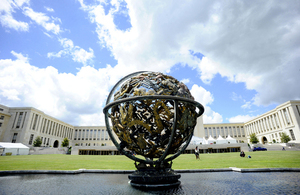UK Statement to the UN Economic and Social Council's Humanitarian Segment
The UK reaffimed its commitment to humanitarian responce and called for stronger partnerships to deliver more significant change.

UN Globe
Thank you Chair,
The UK would like to align itself with the EU statement, delivered by Romania.
All of us in this room today are moved by the unprecedented scale and severity of crises occurring in the world.
Humanitarian crises like Syria, Yemen, DRC, South Sudan, Somalia, north east Nigeria and Mozambique, are overwhelmingly man-made, driven by conflict, broken politics and instability, and exacerbated by climatic and environmental factors. These crises cause untold death and suffering and undermine peoples’ resilience and ability to escape the grip of poverty.
Compliance with international humanitarian law has never been more important. Civilians, hospitals and aid workers are deliberately targeted , as seen recently in Idleb, in Syria. Besiegement, the denial of aid and starvation are routinely used as weapons of war. Conflict induced displacement and refugee numbers are at an all-time high.
There are currently more than 140 million people in need of protection and assistance. The UN is appealing for a record $26.32 billion for the 2019 response.
The UK is one of the world’s biggest humanitarian donors, and we are proud of our generous and international spirit. We are committed to stay at the forefront of this effort, working with our international partners in responding to the needs of the most vulnerable in crises, including women and girls and people with disabilities. We are proud to be part of the global compacts on refugees and migration, and the global refugee forum, initiatives supporting those who flee crises in search of safety and security.
Firstly, we will continue to be among the first to act when disasters strike, as we have done recently in response to needs arising from cyclones IDAI and Kenneth in Mozambique and Venezuela, and our response to the Ebola outbreak in DRC and neighbouring countries.
But, we all know this isn’t enough. Working with others, we will support improvements in the ways we anticipate and prepare for crises, investing in prevention, resilience, preparedness and risk financing. Our aim is to see disasters and crises no longer being treated as if they were unpredictable catastrophes.
Secondly, we will continue to make long-term commitments and funding to help the most vulnerable in protracted crises meet their immediate needs, while at the same time helping them build resilience to future shocks.
We will build on work initiated in Nigeria, South Sudan and DRC to support the humanitarian, development and peacebuilding work to tackle protracted crises more effectively, and reduce humanitarian needs over time.
Thirdly, we will continue to play a key role in delivering system reforms, including: a strategic approach to the protection of civilians and access; greater availability of data and more prioritised needs assessments; a greater use of cash in responses; better accountability to affected populations and appropriate safeguarding.
And lastly, the UK will work with others to harness the potential of new technology and new partnerships to respond to the humanitarian challenges of the future.
In partnership together, we can drive necessary change. At the World Humanitarian Summit, we agreed a clear vision for a radically improved humanitarian system where our collective responses are faster and more effective.
Two year’s on from the World Humanitarian Summit, this Humanitarian Affairs Segment of ECOSOC represents a key opportunity for us to come together, recognise progress and redouble efforts to reform. It has to be a global effort. The world cannot afford to wait.
Thank you Chair.